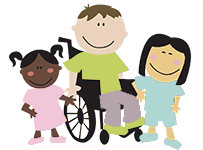Back to School Time – Will Your Child Be Ready?
[vc_row][vc_column][vc_column_text]August is just starting! It may seem a little early to be thinking about the new school year. However, being thoughtful about the adjustments that your child will need to make in the fall can help him or her begin the new school year with greater success and less anxiety.
During the Summer
One thing to keep in mind as we move through the summer, is that the more changes a child (or anyone) experiences in his or her summer routine, the harder transitioning back to a school year routine may be. So think about what activities and routines you can keep in place for your child throughout the year.
For example:
Don’t vary bed time and wake up time too much.
Keep the same chores in place.
Maintain certain family rituals such as mealtime and story time.
Is there a certain time in the evening that you read with your child, or play a board game? Keep that quality time in place throughout the year. Also, keep a calendar throughout the year that reflects important dates and activities, such as holidays, birthdays, planned vacations, school, breaks, and the first and last day of school.
Are there certain school friends that your child typically only sees during the school year? Try to set up regular visits throughout the summer. Maybe have a back to school party in late summer!
Two Weeks Before School Starts
Time to really get serious about a positive beginning!
Return your child to his or her school time schedule: have your child get up at the time that is typical for a school day, get dressed, eat breakfast, and do anything else that is a part of the school day morning routine. Then get in the car and go somewhere where you can sit and do a focused activity. Like reading a book at the library or visiting a friend to complete an art project. The key is to get your child use to starting their day with activities that mimic the expectations and focus of school.
In the afternoon, around the time your child would be returning from school, be sure he or she has had a snack and then, again, schedule in some quite focused time similar to when they would typically do homework. Again, this is a good time to read a book.
In the evening, have your child get clothes ready for the next day, as well as whatever items he or she typically organizes on a school night, and then have him or her go to bed at the “school night” time.
Hopefully your child is aware that school will be starting soon from looking at a family or personal calendar. Talk with your child about the school year, their new teacher, and the fun things that happen with school, like making new friends, seeing old friends, and learning new things. Communicate excitement about school!
Those last two weeks, look at the calendar together each day to see what events you can add that prepares your child for the new school year. Do you need to buy some school supplies? New clothes? Have a play group with friends from school? What about scheduling a visit to the class room and meeting the teacher? All of these events will help facilitate the transition into a positive school year.
Reading has been mentioned throughout this article for many reasons. For one, it helps keep a child’s academic skills up or helps develop emerging skills in very young children. It is also a focused activity that will help with increasing attention. This is an important skill for school. Additionally, you can focus your reading the last few weeks for the summer on books that will increase excitement about school as well as decrease anxiety about a new situation, new teachers, and new friends. Here are some great choices for quality reading time with your child, from preschool into elementary school.
Preschool

https://www.barnesandnoble.com/w/preschool-day-hooray-linda-leopold-strauss/1111846843
https://www.scholastic.com/teachers/books/froggy-goes-to-school-by-jonathan-london/
Kindergarten
Elementary
https://www.barnesandnoble.com/w/if-you-take-a-mouse-to-school-laura-joffe-numeroff/1103216532
http://www.harpercollinschildrens.com/books/Pete-Cat-Rocking-My-School-Shoes/
Speech & Occupational Therapy of North Texas provides speech therapy and occupational therapy assessment and treatment at three Collin County locations. We have clinics providing OT and speech therapy in Frisco, Plano and McKinney. If you suspect your child has a speech, language or feeding challenge or a fine motor, sensory or coordination challenges, we would love to help you. Call our client specialists at 972-424-0148. Speech & Occupational Therapy of North Texas is a network provider for many major insurance plans.[/vc_column_text][/vc_column][/vc_row]

 http://www.penguinrandomhouse.com/books/292865/look-out-kindergarten-here-i-come-by-nancy-carlson/9780140568387/
http://www.penguinrandomhouse.com/books/292865/look-out-kindergarten-here-i-come-by-nancy-carlson/9780140568387/